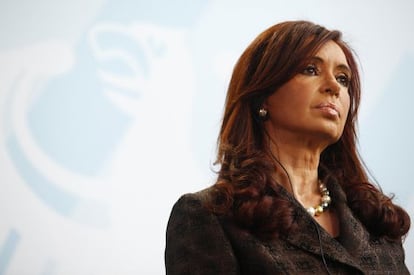Prosecutor’s death casts suspicion on Argentina’s most feared spy
Nisman filed charges against president in retaliation for agent's dismissal, officials say


Faced with growing pressure concerning the mysterious death of a prosecutor who had accused her of participating in a cover-up conspiracy, Argentinean President Cristina Fernández de Kirchner is convinced that the investigator was duped by a rogue intelligence agent who leaked false information about the 1994 bombing of a Jewish community center.
The sudden death of federal prosecutor Alberto Nisman, 51, has set off a storm of conspiracy theories across Argentina.
Nisman was killed by a gunshot wound to the head just one day before he was scheduled to testify in Congress about charges he filed against Fernández de Kirchner and other officials for allegedly trying to protect Iranian officials from facing prosecution in the terrorist attack at the AMIA center, which left 85 people dead and dozens injured. His body was found at his home on Sunday.
While investigators have not ruled out suicide, the Argentinean leader said on Thursday in surprisingly candid remarks posted on her Facebook page that she was “convinced” that the prosecutor did not kill himself. But other than suggesting that others may have led him astray, she did not explicitly point the finger at anyone who might have been involved in Nisman’s death.
The justice minister was fired for publicly denouncing Stiusso as a feared spy during a TV interview
Although international arrest warrants were issued for five Iranians and one Lebanese national in 2007, the investigation into the bombing had been stalled.
But on January 14, Nisman accused the president of negotiating a grain-for-oil deal with Iran in exchange for impunity for the wanted terrorists. In a 300-page report handed to a judge, he based his accusations on a series of surveillance recordings of conversations between diplomats and Iranian officials made by Argentina’s intelligence services.
Casa Rosada presidential palace officials believe that Nisman filed the charges in retaliation for the dismissal of Antonio Horacio Stiusso, a powerful official within the Argentinean SIDE intelligence agency.
Stiusso, alias Jaime, has a reputation as a headstrong spy and had been assigned to different posts with SIDE for the past 20 years. He was head of operations until Fernández de Kirchner ordered a shake-up at the agency last month.
Many government officials feared and loathed Stiusso, and he was considered untouchable.
Then in 2004, then-Justice Minister Gustavo Béliz decided to take on Stiusso, accusing him of managing millions in secret funds and attempting to offer then-President Néstor Kirchner (2003-2007) false information about the AMIA bombing.
During a television interview, Béliz held up a photograph of the spy. “The SIDE is being run by a man that everyone fears because he is dangerous and can have you killed. This man has served in all past governments and his name is Jaime Stiusso.”
Soon after, Néstor Kirchner demanded Béliz’s resignation. “It is the price I had to pay for telling the truth. I messed with the darkest machinery in all Argentina, which is the SIDE,” the former minister later said.
Working on the AMIA investigation, Stiusso was able to make contacts with the CIA, FBI and Israel’s Mossad. Even though he kept a low profile, the intelligence officer complained last November that he felt threatened.
“A meteorite can fall tomorrow and I get blamed for it,” he told the magazine Noticias, referring to accusations made against him. Stiusso was fired immediately after the interview.
After Nisman filed his charges, the president’s chief of staff, Aníbal Fernández, blamed the entire operation on Stiusso whom he said was working on the AMIA investigation on his own.
“I know Stiusso, I have been with Stiusso; he is one of the people who knows the most about the AMIA case,” Nisman said during a television interview in response to the chief of staff’s remarks.
“When Néstor Kirchner put me in charge of the case, I already knew Stiusso. He told me: ‘This person is the one who knows everything about what you are going to be working on.’ The AMIA case is an international terrorist attack, so of course I have to work with intelligence agencies.”
Tu suscripción se está usando en otro dispositivo
¿Quieres añadir otro usuario a tu suscripción?
Si continúas leyendo en este dispositivo, no se podrá leer en el otro.
FlechaTu suscripción se está usando en otro dispositivo y solo puedes acceder a EL PAÍS desde un dispositivo a la vez.
Si quieres compartir tu cuenta, cambia tu suscripción a la modalidad Premium, así podrás añadir otro usuario. Cada uno accederá con su propia cuenta de email, lo que os permitirá personalizar vuestra experiencia en EL PAÍS.
En el caso de no saber quién está usando tu cuenta, te recomendamos cambiar tu contraseña aquí.
Si decides continuar compartiendo tu cuenta, este mensaje se mostrará en tu dispositivo y en el de la otra persona que está usando tu cuenta de forma indefinida, afectando a tu experiencia de lectura. Puedes consultar aquí los términos y condiciones de la suscripción digital.








































